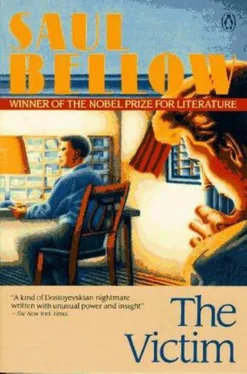Saul Bellow - The Victim
Здесь есть возможность читать онлайн «Saul Bellow - The Victim» весь текст электронной книги совершенно бесплатно (целиком полную версию без сокращений). В некоторых случаях можно слушать аудио, скачать через торрент в формате fb2 и присутствует краткое содержание. Год выпуска: 1988, Издательство: Penguin Books, Жанр: Современная проза, на английском языке. Описание произведения, (предисловие) а так же отзывы посетителей доступны на портале библиотеки ЛибКат.
- Название:The Victim
- Автор:
- Издательство:Penguin Books
- Жанр:
- Год:1988
- ISBN:нет данных
- Рейтинг книги:3 / 5. Голосов: 1
-
Избранное:Добавить в избранное
- Отзывы:
-
Ваша оценка:
- 60
- 1
- 2
- 3
- 4
- 5
The Victim: краткое содержание, описание и аннотация
Предлагаем к чтению аннотацию, описание, краткое содержание или предисловие (зависит от того, что написал сам автор книги «The Victim»). Если вы не нашли необходимую информацию о книге — напишите в комментариях, мы постараемся отыскать её.
The Victim — читать онлайн бесплатно полную книгу (весь текст) целиком
Ниже представлен текст книги, разбитый по страницам. Система сохранения места последней прочитанной страницы, позволяет с удобством читать онлайн бесплатно книгу «The Victim», без необходимости каждый раз заново искать на чём Вы остановились. Поставьте закладку, и сможете в любой момент перейти на страницу, на которой закончили чтение.
Интервал:
Закладка:
“There have been times when I felt like that, too,” Leventhal went on. “That’s a feeling that comes and goes.” His brother turned his crude, dark face up to him and his voice died.
They sat together in silence and at last Max stirred and got up. Leventhal went with him to the subway. A heavy mist lay over the street. At the turnstile he dropped two nickels into the slot and Max said over his shoulder, “You don’t have to wait with me.”
But Leventhal pushed through. They stood at the edge of the platform till the grind of the approaching train reached them.
“If you need me for anything…” Leventhal said.
“Thanks.”
“I mean it.”
“Thank you.” He extended his hand. Leventhal clumsily spread his arms wide and clasped him. They felt the concussion of the train, and the streaked face of the lead car with its beam shot toward them in a smolder of dust; the windows ran by. Max returned his embrace. “Call me,” Leventhal said hoarsely in Max’s ear. The crowd swirled around them at the doors. When the train started, he saw Max gripping a strap and bending over the heads of passengers, peering out.
Pulling out a handkerchief, Leventhal wiped his sweat. He began to labor up the long, steel-striped concrete flights, opening his mouth to assist his breathing. Halfway up he stopped, squeezing against the wall to let others past, looking as if the lack of air maddened him. He felt faint with the expansion of his heart.
Then he continued. The mist had gathered to a light rain. At the top of the stairs he saw an umbrella flung open, like a bat in the chill current of air. The bars of the revolving door raced and clinked. Buttoning his coat, he raised the collar, and his eyes moved from the glare of the cars flowing up in the street to the towering lights that stood far ahead, not quite steady in the immense blackness.
21
IN the Saturday mail there was an invitation from Mrs Harkavy to a party that same evening in honor of her granddaughter’s seventh birthday. The postman whom Leventhal encountered in the fog on the outer stairs handed it to him. There was nothing from Mary and he was secretly glad of it, for the truth was that he felt he was stealing away and leaving Allbee in possession of the house. Ostensibly he was going out for coffee. He had risen to find the flat cold, and the windows dripping and gray as tin. Allbee was still asleep in the dining-room, his naked arms locked around the narrow mattress, sprawling, uncouth. His clothes lay on the floor and the air was stifling. Leventhal had gone into the kitchen and put on the coffee but, when he pictured himself sitting down in the cheerless front room to drink it, he made a face, shut off the gas, and went down to eat at the Greek’s. But he had no intention of coming back after breakfast.
Around Mrs Harkavy’s invitation he half unconsciously and in a complicatedly indirect fashion made out a schedule. He was at first uncertain about attending the party. Should he go so soon after Mickey’s death? But, having decided that it would be a good thing for him to be among people, he rode uptown to buy the girl a present. And finding himself near the library at noon, he spent a few hours glancing over some of the trade papers to see what others were doing. So it was nearly evening and he was coming out of a newsreel theater in Times Square before he realized that behind everything he had contrived to fill this weary day was his unwillingness and inability to deal with Allbee. He had set off purposefully down Broadway, and now something seemed to hinder the steady action of his legs and he faltered and began to go slower.
“All right, I’ll send him to Shifcart,” Leventhal decided. “What do I care? I’ll do it, and if that isn’t enough for him, we’ll see. Only what will Shifcart think?” But he was already in disfavor with Shifcart, who had looked at him peevishly in the cafeteria when he failed to laugh at his joke. “It would be better to come in cold than with a recommendation from me. But as long as he believes so much in connections let him go and find out for himself.”
He stopped at home before dinner to put on a clean shirt. Allbee was out. The dirt and disorder of the place sickened Leventhal. There was rubbish on the kitchen floor and the remains of a meal on the table. “He’d behave better in a flophouse. He’s just trying to show me,” thought Leventhal. He swept out the kitchen. Bending down with the dust pan, he experienced a curious tightness in the skin of his face. He threw the broom into the corner, washed his hands, and left.
Mrs Harkavy met him in the entry and she disconcerted him by saying, “I was awfully upset to hear about your nephew.” For he had just then, in the elevator, been thinking about Mickey. “Doctor Denisart told me about it. I’m sure he did his best.”
Leventhal muttered that he thought so too. Because he was disturbed, he was more conscious than usual of the bracing process he went through on meeting one of the Harkavys. He was fond of them, they were kind, but he had never been able to work out a satisfactory balance with them. Mrs Harkavy’s expression was like her son”s, lively and erratic. Yet there was a durable, underlying melancholy in her animation, and occasionally it came uppermost and took him by surprise.
“Someday science will conquer death,” she said. “Last Sunday there was a symposium in the Times about it.”
Leventhal pulled himself together sufficiently to reply, “I hope…”
“Oh, it looks definite. Then the size of the population will have to be controlled. But science will figure that out, too. There are brains enough for everything. This man discovered something to make the tissues live forever. I don’t think we can expect much in our lifetime. It’s for future generations. Meanwhile, we have to make the best of it. I think Mr Banting’s father died of diabetes about a year before insulin was discovered. And this Mr Bogomolets couldn’t use his own serum on account of a bad heart, and he died. Asa, how old was the child?”
“Three and a half, four.. ”
The freakishness seemed to leave her. Only her eyes moved, meeting his own with a familiar, instantaneous significance.
“That’s the brother who lives in Queens?”
“Staten Island.”
“Asa, sometimes I feel wicked still to be here at my age while children die.”
He was at a loss for an answer.
“But I’m not taking it away from anybody,” she said, falling back into her eccentricity; it quivered at the corners of her green-ringed eyes.
“Mamma,” Julia called.
“The men are in the dining-room, Asa. There’s wine and liquor on the sideboard.” Her face was flushed and she turned away, wide-hipped in her blue dress with its ornamented shoulders.
The guests, none of whom he knew, were playing pinochle. He was disappointed. He had hoped to see Schlossberg or Shifcart.
“Take a hand,” said Harkavy.
“No, I don’t think I will. Is anybody else coming, Dan?”
“We’re expecting a few more people,” said Harkavy. He was engrossed in his cards.
Leventhal poured himself a glass of wine and took a diamond-shaped biscuit sprinkled with sugar. Suddenly he remembered the present he had brought and he drank down the wine, tugged the package out of his pocket, and went into the kitchen. There was a cloud over the range. Julia was raising a colander of fried potatoes from the oil, averting her face from the sputter and crying nervously, “Mother, Mother, keep Libbie back.”
“Stay away, honey. Julia, don’t rush those potatoes. They’ll be raw.”
Leventhal came forward with his package.
“I brought something for the girl.”
“Oh, how thoughtful of you,” said Mrs Harkavy. “With all your own troubles.”
Читать дальшеИнтервал:
Закладка:
Похожие книги на «The Victim»
Представляем Вашему вниманию похожие книги на «The Victim» списком для выбора. Мы отобрали схожую по названию и смыслу литературу в надежде предоставить читателям больше вариантов отыскать новые, интересные, ещё непрочитанные произведения.
Обсуждение, отзывы о книге «The Victim» и просто собственные мнения читателей. Оставьте ваши комментарии, напишите, что Вы думаете о произведении, его смысле или главных героях. Укажите что конкретно понравилось, а что нет, и почему Вы так считаете.











